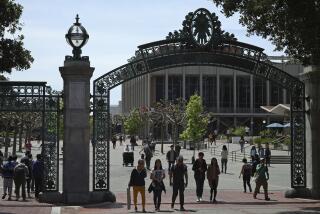Judges, Lawyers Complete Study
- Share via
A dozen Jewish lawyers and judges this week completed a 2 1/2-year-long tractate of Talmud, meeting in monthly sessions to study ethical lessons contained in Pirkei Avot, or “Ethics of the Fathers.”
Following Jewish tradition, the group celebrated Wednesday with a siyum--in this case, a pastrami lunch at the Orange County Bar Association.
The tractate, from a Latin word meaning discussion or treatise, grew out of a lunchtime Talmudic group that met at the Rutan & Tucker law firm in Costa Mesa, where the participants decided to study ethics in the Talmud.
The sessions were led by Rabbi David Eliezrie of the Chabad Center and the National Institute of Jewish and Contemporary Law, both in Yorba Linda.
“Beyond the fact that a bunch of judges and lawyers get together once a month--and these are not billable hours here--a lot of them are saying this is giving them insight into their own lives,” Eliezrie said.
“As lawyers, we tend to think we’re so all-knowing,” said Robin Brandes-Gibbs of Dana Point, a research attorney for the Orange County Superior Court. “It gives you a sense of humility knowing law isn’t the only thing you need to worry about in your life.”
Brandes-Gibbs, secretary of the study group, said she discovered parallels between Talmudic law and contemporary secular law, particularly in the “division of powers between rabbis and the king, which is like the legislature and the president, and how laws are enforced and followed and who makes the decisions.”
One key difference, though: Where contemporary law can shift with changes on the U.S. Supreme Court, Talmudic law is unchangeable.
“It’s absolute law,” she said. “It’s set in stone. You can argue about what it means, but the underlying principles you cannot change.”
More to Read
Sign up for Essential California
The most important California stories and recommendations in your inbox every morning.
You may occasionally receive promotional content from the Los Angeles Times.













